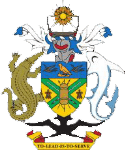The Ministry of Environment, Climate Change, Disaster Management and Meteorology (MECDM) is responsible for sustainable environmental management, climate change adaptation and mitigation, disaster risk management and meteorological services for the Solomon Islands. The Ministry is organised into four technical divisions that look after each of the technical areas, namely environment and conservation, climate change, disaster management, meteorology. There is a separate division that is responsible for corporate services.
Our Vision
“A safe, sustainable and resilient environment for Solomon Islands”
Our Mission
“To provide an enabling environment for the socio-economic development of the Solomon Islands through the application of necessary safeguards with regard to:
- sustainable use of natural resources;
- the provision of meteorological services;
- reducing the risk and impact of climate change and other hazards to communities;
- Leading and managing disaster preparedness and their consequences.
The MECDM is relatively new (amalgamated in 2007 and expanded in 2010). Its key mandates are to promote and ensure safe, sustainable and resilient Solomon Islands communities and to coordinate and guide the sustainable use and conservation of the Solomon Islands’ natural resources and ecosystems, as well as providing key data services such as meteorological information and disaster risk reduction and management strategies.
These mandates are derived from both Cabinet decisions and legislation. As one senior staff of the Ministry put it, the MECDM’s mandate is distilled to that of a “safeguards” Ministry to enable sustainable socioeconomic development in the Solomon Islands.
Structure
The MECDM is led by a Minister. Under the Minister is the Permanent Secretary (PS), an Under Secretary Technical (UST) and 4 Divisions and 1 Office which include:
- Climate Change Division (CCD)
- Corporate Services Division
- Environment & Conservation Division (ECD)
- Meteorological Services Division
- National Disaster Management Office (NDMO)
Each Division is headed by a Director except for the Corporate Services Division which is headed by a Human Resource Manager (HRM).
At the regional and international levels, each Division acts as a national focal point for various agreements.
Guiding Legislation
There are five legislated mandates associated with MECDM divisions. The Environment & Conservation Division is responsible for three acts, namely:
The Meteorological Division is responsible for the Meteorology Act 1985 and the National Disaster Management Office is responsible for the National Disaster Council Act 1989.
Other laws that govern the MECDM’s areas of work include:
- The Essential Services Act and;
- Civil Aviation Act 2008
- Part 174 Civil Aviation Rules – Aviation Meteorological Service Organisation Certification and.
National Framework
The Solomon Islands National Development Strategy 2016-2035 is the country’s main development strategy. Of the document’s 5 objectives, objective 4 is the most relevant to the MECDM’s work.
This objective aims to achieve “Resilient and environmentally sustainable development with effective disaster risk management, response and recovery.” This is divided into two mid-term strategies that aim to achieve this objective:
- Improve disaster and climate risk management including prevention, risk reduction, preparedness, response and recovery and adaptation as part of resilient development.
- Manage the environment in a sustainable resilient way and effectively respond to climate change. At the national level, interventions to achieve these objectives are implemented by numerous agencies but mostly MECDM.
These objectives are further supported by the actions of the ruling DCC Government Policy Strategy.
Furthermore, the MECDM has its own plans, policies and strategies which give the Ministry a wide scope of responsibility. The Ministry’s key policies, plans and strategies include:
- National Environment Management Strategy (NEMS 1993)
- First National Communication (FNC 2001)
- National Adaptation Plan of Action (NAPA 2008)
- National Capacity Self-Assessment (NCSA 2008)
- National Environment Capacity Development Action Plan 2008-2012 (NECDAP 2008)
- National Biodiversity Strategy Action Plan (NBSAP 2009)
- National Solid Waste Management Strategy 2009 - 2014
- Coral Triangle Initiative Action Plan (CTIAP 2010)
- National Disaster Risk Management Plan (NDRMP 2010)
- National Climate Change Policy 2012-2017 (NCCP 2012)
- National REDD+ Readiness Roadmap 2014
- MECDM Strategic and Corporate Plan 2015-2017 (MECDM 2015)
- National Turtle Action Plan
- National Dugong Action Plan
The MECDM also has several other pipeline policies, strategies, frameworks and plans. Please contact the Ministry for more information on these.

